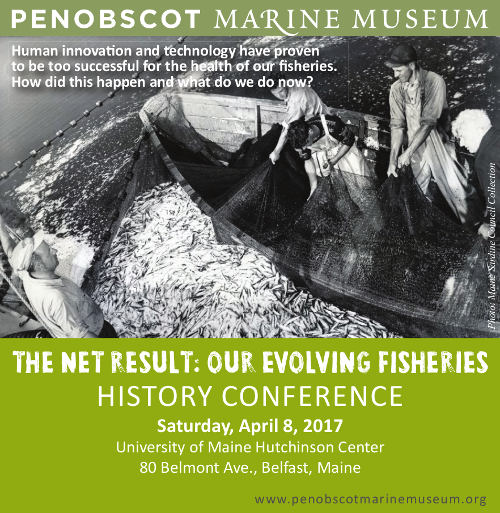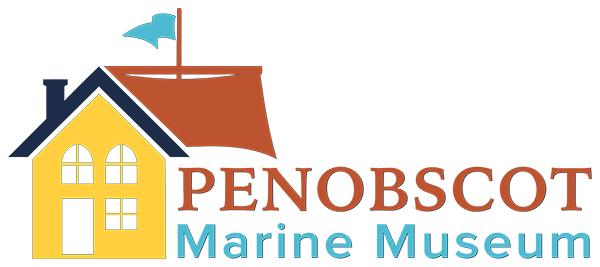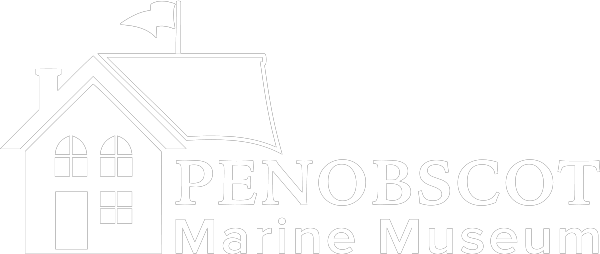Special Events at PMM
Lectures, Workshops, Events
You’re invited to join us at Penobscot Marine Museum for our ongoing series of special events! For more information, contact Jeana Ganskop, Education Director, at 207-548-2529 or jganskop@pmm-maine.org.

- This event has passed.
The Net Result: Our Evolving Fisheries
April 8, 2017 @ 8:30 am - 2:30 pm


The Net Result: Our Evolving Fisheries
History Conference
Saturday, April 8, 2017
8:30 a.m. – 3:30 p.m.
University of Maine Hutchinson Center
80 Belmont Avenue, Belfast, Maine
Student: $30
Museum Members: $50
Teacher/Non-Profit Employee: $50
Non-members: $60
This year’s History Conference delves into statement: Human innovation and technology have proven to be too successful for the health of our fisheries and our local ecosystem. Our line-up of scientists, historians, journalists, activists, consumers and fishermen will answer the question:
How did this happen and what do we do now?
The History of Overfishing: the Price of Efficiency
Jeffrey Bolster, University of New Hampshire Professor of History
Jeffrey Bolster brings historical context to the present issues facing the fishing industry. As author of The Mortal Sea: Fishing the Atlantic in the Age of Sail, he shows that while the eradication of fish has gone on for centuries, the impact of fishing in the 20th century has been devastating.
Taking Stock: the Story Data Tells About Our Fisheries
Ted Ames, Fisheries Ecologist & Co-founder of Penobscot East Resource Center
Using catch data from historic fishing logs and other sources, marine ecologists have tracked the decline in fishing stocks as the use of more efficient fishing technology rose. Ted Ames, a fisherman and historical fisheries ecology researcher, whose work in marine conservation earned him a MacArthur Fellowship, looks at the past and present scientific data on the groundfish stock and predicts future trends if conservation measures are adopted or ignored.
The Search for Consensus: Sustaining the Fisheries
Peter Neill, Director of World Ocean Observatory
Peter Neill has been advocating for the health and sustainability of our oceans through numerous means of communication. He will discuss the evolution of the scientist-fishery harvester conversation and initiatives by each to address sustainability issues and meet conservation objectives imposed by regulatory bodies.
Groundfish Policy in Maine: a Retrospective
Patrick Shepard, Fisheries Policy Associate at Penobscot East Resource Center
Fisheries policy and conservation have not always been synonymous in our history. Patrick Shepard walks us through the major turning points in the groundfish regulations and brings us the current crossroad in policy as we plot the future of this historically important fishery.
Gastronomy and the Sea: Our Changing Tastes
Nancy Harmon Jenkins, Food Historian and Writer
The seafood, we as humans consume, has evolved over time based on the availability of the resource locally and through Trans-Oceanic trading webs, as well as the latest culinary trends. Food historian Nancy Harmon Jenkins charts the rise and fall of salt fish, sardine on crackers and other seafood favorites from the past, discusses current seafood consumption and predicts future seafood culinary trends.
Turning the Tide on Decline: The Fisherman’s Perspective
Glen Libby, Manager of Port Clyde Fresh Catch and co-author of Caught: time, place, fish.
As a fisherman, Mr. Libby has seen how the technological revolution has impacted how and where fishermen fish over a period of several decades. Not all of these advances were good from a sustainable fisheries perspective but we are now learning how to use technology to enhance the recovery of our groundfish fishery here in Maine.
Documenting the Evolution: National Fisherman
Dave Jackson, former publisher of National Fisherman
National Fisherman has been the periodical of record for the fishing industry for over 65 years, providing context for today’s hot button issues in the industry. Former publisher Dave Jackson, using photographs from the periodical’s pages, will explore how National Fisherman documented the technological evolution in the fisheries and the resulting ecological and social effects.
For more information or to register by phone, please call 207-548-2529.

